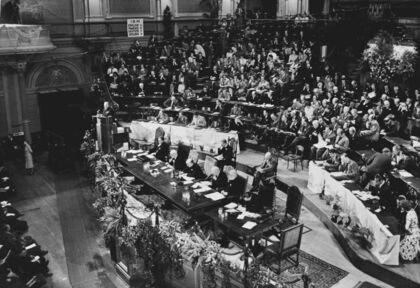World Council of Churches

The World Council of Churches is a fellowship of churches of the Protestant, Anglican, Orthodox, and old Catholic traditions. It was formed on August 23, 1948, in Amsterdam, Holland, for study, witness, service, and advancement of unity. It has member churches in over ninety countries. Council headquarters are in Geneva, Switzerland, although it maintains a branch office in New York City.
In the United States, the World Council of Churches is aided in carrying out their policies by the United States Conference for the World Council of Churches, Inc.
The National Council of Churches of Christ in the United States of America is a cooperative federation of thirty Protestant and Orthodox Churches formed in 1950 by the merger of twelve interdenominational agencies.
Political activities
The National Council of Churches and the World Council of Churches have been attacked many times for nurturing Marxist causes, disseminating Marxist propaganda, and even providing financial assistance to Marxist terrorists—but rarely by the major networks or press. Newsweek magazine’s former senior editor and chief foreign correspondent, Arnaud de Borchgrave, says stories he submitted to Newsweek on the leftist activities of the World Council of Churches were invariably spiked, or not used, by the New York office.
The council’s involvement in politics has been defended by its leaders on the basis that church unity is benefited by resolving economic, racial, and educational problems. Between the years of 1970 and 1982, its Program to Combat Racism (PCR) contributed over $5 million to organizations fighting racial prejudice; almost half of these funds went to guerrilla groups attempting the violent overthrow of white pro-Western governments in southern Africa—including the Soviet-backed MPLA of Angola, the Marxist FRELIMO in Mozambique, and the Russian-supplied/Cuban-trained SWAPO in Namibia.
In an expose on the National and World Councils of Churches (“The Gospel According to Whom?” aired January 23, 1983), CBS’s “60 Minutes” investigated the N.C.C.’s alleged involvement in Castro and Communist-led activities in Central America and examined the financial support given by Protestant churches to “causes that seem closer to the Soviet-Cuban view of the world” than to that of American churchgoers who unknowingly provide the funds.
The dangers of a one-world religion
El Morya has spoken about the World Council of Churches:
The Great White Brotherhood sees the unity of nations under God, sees the oneness of Light both in government, in science, and in religion—this only when the point of individual Christhood is attained for the responsible use of these avenues leading toward the unification of all....
“I am for a one-world religion,” they will say. But you must ask, “What kind of world religion? Under whose domination? A World Council of Churches that denies the individualization of the God flame? that denies the divinity of Christ in every man? that denies the option for the resurrection and the ascension? that denies karma and reincarnation as a cycle and a spiral of opportunity and a path of initiation?”
Beloved ones, the more centralized is control, the less control the individual may exercise over his own life. Whether in religion or a universal academy of science or medicine or the government, you will see that unless it is truly God who is at the center of their sun, there can only be the red sun going down that is not of the Light.[1]
See also
Sources
Pearls of Wisdom, vol. 26, no. 46, November 13, 1983.
Elizabeth Clare Prophet, May 29, 1983.
- ↑ El Morya, “The Universal Religion,” Pearls of Wisdom, vol. 28, no. 51, December 22, 1985.
